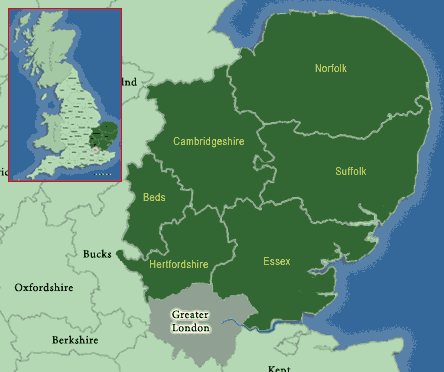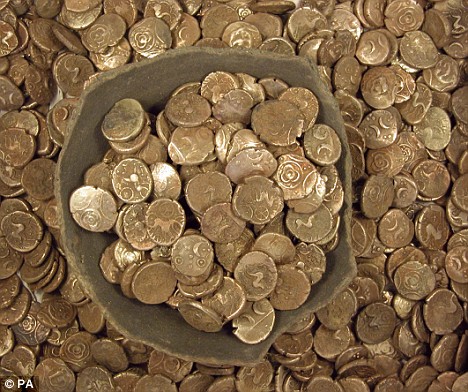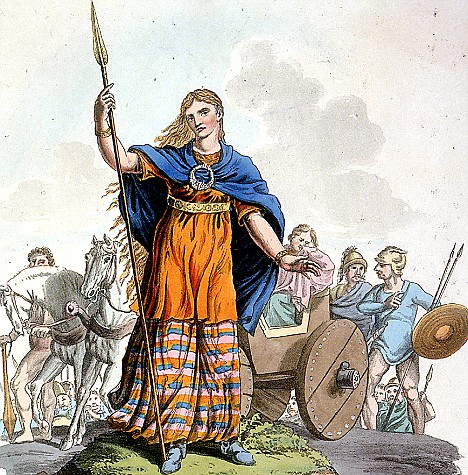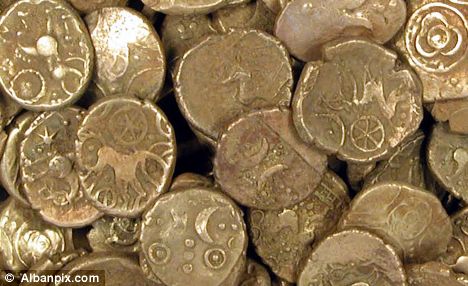A metal-detecting enthusiast has found 824 gold Iceni coins in a field in Wickham Market, Suffolk.
The Iceni were a British tribe who lived in the area now comprising the three counties of Suffolk, Norfolk and Cambridgeshire in south east England.
The Queen of the Iceni in the mid-1st Century was Boadicea (or Boudicca).
She committed suicide in 61AD after taking on the Romans and lost. She was angry after watching Roman soldiers rape her two daughters whilst she was flogged.
The coins were minted between the years 40BC and 15AD and are worth a whopping £250,000 (almost US$344,000), or worth the equivalent of £1 million in her day.
They are stamped with moons, wheels and horses
Boadicea's gold found
Buried hoard dating back to era of warrior queen
By David Wilkes
18th January 2009
Daily Mail

The Iceni occupied what is now East Anglia (Suffolk, Norfolk, Cambridgeshire)
For 2,000 years, this enormous fortune lay undisturbed in the ground where it had been left as a gift to the gods.
The 824 gold coins were minted by the deeply-religious Iceni tribe, made famous by the warrior queen Boadicea.
They have been dated to some time between 40BC and 15AD and are worth up to £250,000 at today's values.

The collection of 824 gold staters was found in a broken pottery jar buried in a field
That sum is likely to be split between the metal- detecting enthusiast who found the coins and the owner of the land he was working on.
The Iceni made regular offerings to the gods by leaving valuable goods in rivers or sacred groves.
They would also bury their treasure when under threat.

Rebel ruler: Boadicea took on Rome and lost
But it seems unlikely that these coins were buried for safekeeping, and then forgotten, because they were simply too valuable. Instead they would probably have been a gift to the gods - and one worth the equivalent of £1 million in Boudicea's day.
The Iron Age coins - stored in a pottery jar - were recovered in October from a field near Wickham Market in Suffolk.
Jude Plouviez, of the county's archaeological service, said: 'It's an exciting find.
'The discovery is important because it highlights the probable political, economic and religious importance of an area.
'It certainly suggests there was a significant settlement nearby. As far as we understand, it was occupied by wealthy tribes or sub-tribes.'

The largest hoard of prehistoric gold coins have been discovered by a metal detector in in a field near Wickham Market, Suffolk. The coins are stamped with moons, wheels and horses
Excavations were carried out at the site after the metal-detecting enthusiast, who does not wish to be identified, reported the find.
The exact location has not been made public to stop it being raided by treasure hunters.
Peter Dean, Greater Suffolk Coroner, has been informed and will hold an inquest to rule whether the hoard should be declared 'treasure'.
If it is, a valuation committee will determine how much the coins are worth so that they can be sold to a museum. The proceeds will then go the finder and the landowner. Collectors would pay around £300 for each of the coins, or staters.
It is the largest hoard of Iron Age gold coins unearthed in Britain since 1849, when a farm worker found between 800 and 2,000 in a field near Milton Keynes.
The Iceni lived in timber roundhouses with thatched roofs and walls of wattle and daub.
Most families grew their own food and made their own clothes but the wealthiest bought wine and other luxuries including jewellery and animal furs from Gaul and Italy.
Boadicea took her own life in 61AD after an abortive uprising against the Romans who had invaded 18 years earlier.
dailymail.co.uk
The Iceni were a British tribe who lived in the area now comprising the three counties of Suffolk, Norfolk and Cambridgeshire in south east England.
The Queen of the Iceni in the mid-1st Century was Boadicea (or Boudicca).
She committed suicide in 61AD after taking on the Romans and lost. She was angry after watching Roman soldiers rape her two daughters whilst she was flogged.
The coins were minted between the years 40BC and 15AD and are worth a whopping £250,000 (almost US$344,000), or worth the equivalent of £1 million in her day.
They are stamped with moons, wheels and horses
Boadicea's gold found
Buried hoard dating back to era of warrior queen
By David Wilkes
18th January 2009
Daily Mail

The Iceni occupied what is now East Anglia (Suffolk, Norfolk, Cambridgeshire)
For 2,000 years, this enormous fortune lay undisturbed in the ground where it had been left as a gift to the gods.
The 824 gold coins were minted by the deeply-religious Iceni tribe, made famous by the warrior queen Boadicea.
They have been dated to some time between 40BC and 15AD and are worth up to £250,000 at today's values.

The collection of 824 gold staters was found in a broken pottery jar buried in a field
That sum is likely to be split between the metal- detecting enthusiast who found the coins and the owner of the land he was working on.
The Iceni made regular offerings to the gods by leaving valuable goods in rivers or sacred groves.
They would also bury their treasure when under threat.

Rebel ruler: Boadicea took on Rome and lost
But it seems unlikely that these coins were buried for safekeeping, and then forgotten, because they were simply too valuable. Instead they would probably have been a gift to the gods - and one worth the equivalent of £1 million in Boudicea's day.
The Iron Age coins - stored in a pottery jar - were recovered in October from a field near Wickham Market in Suffolk.
Jude Plouviez, of the county's archaeological service, said: 'It's an exciting find.
'The discovery is important because it highlights the probable political, economic and religious importance of an area.
'It certainly suggests there was a significant settlement nearby. As far as we understand, it was occupied by wealthy tribes or sub-tribes.'

The largest hoard of prehistoric gold coins have been discovered by a metal detector in in a field near Wickham Market, Suffolk. The coins are stamped with moons, wheels and horses
Excavations were carried out at the site after the metal-detecting enthusiast, who does not wish to be identified, reported the find.
The exact location has not been made public to stop it being raided by treasure hunters.
Peter Dean, Greater Suffolk Coroner, has been informed and will hold an inquest to rule whether the hoard should be declared 'treasure'.
If it is, a valuation committee will determine how much the coins are worth so that they can be sold to a museum. The proceeds will then go the finder and the landowner. Collectors would pay around £300 for each of the coins, or staters.
It is the largest hoard of Iron Age gold coins unearthed in Britain since 1849, when a farm worker found between 800 and 2,000 in a field near Milton Keynes.
The Iceni lived in timber roundhouses with thatched roofs and walls of wattle and daub.
Most families grew their own food and made their own clothes but the wealthiest bought wine and other luxuries including jewellery and animal furs from Gaul and Italy.
Boadicea took her own life in 61AD after an abortive uprising against the Romans who had invaded 18 years earlier.
dailymail.co.uk
Last edited: